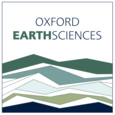Earth Sciences in Conversation: James Bryson
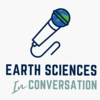
Our Earth Sciences in Conversation series explores the lives and careers of members of the Department, showing readers the people behind our world-leading research. For this issue we sat down with James Bryson, Associate Professor of Mineralogy, to mull over meteorites, delve into dust, and scrutinise science fiction!
Interview by Charlie Rex
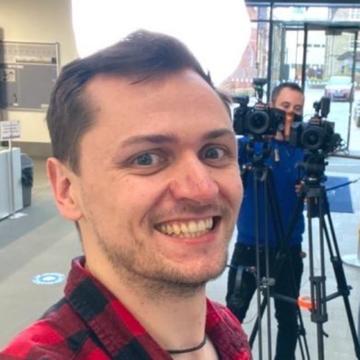
What inspired you to go into Earth Sciences?
I remember talking to my parents about this when I started my PhD. I had a mineral collection when I was maybe 4 or 5 years old, and I’d make my mum take me to the newsagents to buy a magazine that came with a piece of a different mineral each week. And my passion all the way through school was always extraterrestrial stuff, and whenever that would come up as a topic, I'd always really enjoy it. So, when I started a PhD on looking at minerals from space, my Mum pointed out that it made perfect sense for me! I don't know if any one thing particularly inspired me, I think it's just always what I found really interesting and was passionate about from a young age. So now that I can do this as a job, I'm very lucky for that.
Can you tell us a bit about your university journey, and what your career path has looked like so far?
I had quite an atypical pathway. At A levels, I did Maths, Further Maths, Biology and Chemistry, and then I did my undergraduate in Natural Sciences at Cambridge. I thought on day one of my undergrad that I would end up studying biochemistry. But I very quickly realised, with my maths-heavy background, that I wanted to be doing more physics. The problem was, I didn’t have an A Level in physics, so I couldn’t take any of the courses. Instead, I chose all the options that lent more heavily on physics, including physical chemistry and mineral science, which allowed me to specialise in mineral physics, and got me that back door into the subject. After my undergraduate, I stayed in Cambridge for my PhD to look at minerals in meteorites. That allowed me to apply my solid-state physics background to extra-terrestrial samples. After that, I did a postdoc at MIT for 18 months, before heading back to Cambridge as a Junior Research Fellow – but I still spent three months each year at MIT in the summer. I did that until the very end of 2019, and then started at Oxford on January 1st, 2020.
A tough time to start a job, that’s for sure.
Yes. I got about two months before everything shut down!
Was there a particular moment that you decided planetary science was what you wanted to build your career around?
The PhD project that I applied to was actually on soil, but between the advert being published and me starting the project, a really interesting set of papers on meteorites came out. The group (that I ended up joining) at MIT also published a bunch of stuff around that time, and my supervisor and I both recognised that as a really active and interesting area of research. So, despite the project notionally being on soil, we decided it was a good point to make a U-turn. I didn’t realise that was what I really wanted to do until it happened, so I think it was another example of how things have worked out really serendipitously for me!
Is there something that motivates you as a researcher?
I am insatiably curious – not to a fault! – I just really like figuring out how things work. Over the summer just gone, I've really sunk my teeth into two research projects. Because the students aren't here, I've been able to do a real deep dive on them, and it's really helped me to rekindle my enjoyment of the research. I love thinking about a big problem, like “why is the earth habitable” for example, and then saying “what can I do to find a piece of that puzzle?”.
You are currently the Head of Admissions for our undergraduate course. What is your favourite thing about being a part of the admissions process?
It's really, really rewarding when you interview students before they come to Oxford. Obviously, the Oxford degree is challenging by design, more challenging than A Level. So, their first exposure to that level of challenge is often in the interviews. We'll be giving them interview questions that go beyond the A level syllabus, and you can see the students get that spark in their eye the first time they're really pushed. And then when they come to Oxford and start the course, we nurture that. Across the four years, we can see that fully flourish. Going from their very first introduction, to that advanced way of learning, to their fourth-year projects when they are uncovering new science, that’s really rewarding.
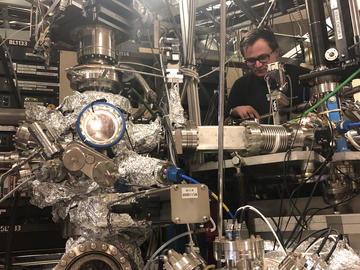
James working at the synchotron
Would you say the research landscape has changed during your career?
There is a lot of stuff that has changed, and quite quickly also. It’s been really interesting to have done this for a decade, as there are things that were assumed to be true back when I started my PhD that we no longer think are correct. There were a big set of breakthroughs around five or six years ago as new machines became available. These allowed us to make measurements which we have never been able to make before, and we have now moved into a data rich regime where we have loads of observations. These are really powerful, but we haven’t achieved a full interpretation of what they all mean, yet.
What would you say is the proudest achievement of your career so far?
My involvement in the Winchcombe meteorite fall in 2021. We have a camera network across the UK which monitors the night sky, and we saw a fireball, and were able to trace it and predict roughly where it would fall. A large chunk of it fell on a family’s driveway, and was in a museum within 24 hours. A nationwide consortium was put together to study it, and scientists who found the meteorite actively chose to have early career researchers lead that effort, including me. To be part of that research effort on a new meteorite that happened to land in the UK, and see that become a paper with 112 co-authors and a special issue of a journal, was really rewarding.
You recently became a dad, congratulations! Has fatherhood changed how you view or approach your career?
Thank you. Yes, it has, in lots of ways. It's made me take a step back and think about things. Obviously being a parent is a lot of effort and work. So, it has really highlighted work-life balance, and in particular the rewards you get from being a parent, and that you don’t want to be missing those for unnecessary reasons. But I get a lot of enjoyment out of my work too, so it’s about that balance.
What would you say to someone who is just starting out in planetary science or mineral physics research?
Find the part of research that you're interested in. I say this at the open days and when prospective students are asking about advice for interviews too. The thing that makes me want to get out of bed on a rainy Tuesday morning in February and come into work is because I'm passionate about what I do. So, I would recommend that you find that passion and sink your teeth into it. Throughout your career, at all levels of research, we have hurdles to overcome. And what will help is your passion for your subject.
Looking to the future, what developments in planetary science do you think will happen in the next decade?
Planetary science is really interesting, because we have very big organisations that have a big influence on the research field – things like NASA, the European Space Agency, and the Japanese Space Agency. And obviously they plan on really long timescales. So we know what the next big space agency projects are for the next decade. There’s the Artemis Mission, which will go back to the moon - they've just announced the astronauts who'll be doing that, and there will be new lunar samples. A large chunk of what we know about the moon comes from a small handful of rocks that the Apollo astronauts brought back, supplemented by lunar meteorites, but there is no geological context for those. We also know that there's a Japanese Space Agency mission called MMX, which will go to Mars's moons, which are really, really small compared to Mars. And spectrally, they look nothing like Mars, unlike our moon, which looks a lot like the Earth compositionally and isotopically. They're also on a different type of orbit to our moon, which makes it look like they've been captured, rather than being a chunk of Mars. This emphasis on sample return by the space agencies is really benefiting the lab-based community, because we will have samples and we can measure the rock directly. That kind of stuff will be really impactful over the next decade or so.
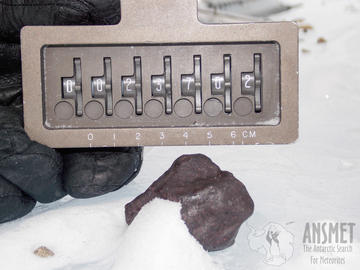
The LAR12252 meteorite - recently analysed by James - when it was discovered in Antarctica. Credit: The ANSMET (ANtarctic Search for METeorites) Program, Case Western Reserve University and the University of Utah.
If you had a direct line to the heads of all the space agencies, what would you want to say to them?
I would like a piece of a comet, please! [laughs] We have loads of samples of meteorites that come from asteroids, we have samples of the Moon and Mars, we might have pieces of comets - there are some meteorites that look anomalous, and one explanation is that they originated from a comet - but obviously there's no substitute for going to a comet and bringing that back. We've landed on comets but never had a piece that we could analyse to understand it in context. Equally, we don’t have samples of Venus or Mercury, because whenever anything gets knocked off a planet, it will go towards the Sun. So the asteroids we capture on Earth are always from further out into space, and we don’t have material from objects closer to the Sun than us. I’d also love for the agencies to build a telescope that could look at other solar systems early on in their formation. We can see them, but because they’re really far away, we don’t have that really granular understanding – we can see protoplanetary discs but we can’t zoom in to see the planet being formed.
That’s a long list of requests!
Yes, I'd like multibillion dollar missions to a comet, Mercury and Venus, and a really powerful telescope, please! [Laughs]
You’ve mentioned the influence of the space agencies, but are there any little-known pioneers in the field?
There has been a hiring spree in the last five to ten years in UK universities, as those who were hired during the research expansion in the 70s and 80s have now retired. So, there are a whole bunch of new early career researchers now leading the way. It’s really fascinating to see this new group of people who are a similar age to me, who have ideas that build on the work of previous generations, but also have brand new ones too. So instead of a specific person, I’d just like to shout out the early career lab-based planetary science community as a whole. And I think the one in the UK is really multifaceted and will hopefully produce some really interesting research over our careers.
I suspect we already know the answer to this, but do you have a favourite meteorite?
I do. In my research I think about things from a very zeroth order approach, and my favourite meteorite reflects that. When we think about how a planet is built, we need to know as much as we can about the initial composition, because that is the foundation of everything that has happened over billions of years. 99% of the mass of the solar system is in Sun, and the composition of the solar system matches the sun. We can measure what the sun is made of using satellites and telescopes, but there is no substitute for the high precision measurements we can do in the lab. There are five or so meteorites with a composition which perfectly matches the sun, and those collectively are my favourite – particularly Orgueil, Alais and Ivuna. If we didn’t have these to ground our knowledge, we wouldn’t be able to understand how anything has changed, because that’s our starting point.
I thought you would say Winchcombe!
Winchcombe is a really interesting meteorite because it's incredibly fresh. It's a very, very nice example of that group of meteorites. But I guess in terms of the longevity and impact on our understanding of planet building, I don't think there's a substitute for those three.
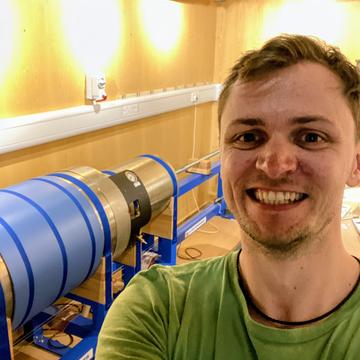
James in the Earth Sciences Palaeomagnetism Lab
If you have the chance to go to space, would you?
Personally, I don't think I'm fit enough. It really would be an amazing opportunity, but given the rigour of training that astronauts go through, I'm not going to be the best person for it! For example, they need to have 20:20 vision and I don’t. I could do a “Katy Perry” and go up and straight back down, but I don’t think I could do much more than that! It would be very cool, but also very daunting.
Our universe is incomprehensively large, isn’t it? It messes with my head a little bit.
[Laughs] Mirroring that, I find it weird that beneath my feet is a boiling hot, thousands of kilometres wide, bit of metal churning around. Obviously I can't get to it, but it’s there in the core.
What is your favourite piece of fiction that involves space or planetary science?
Good question. I’m quite dyslexic, so I don’t actually read a huge amount as I find it quite challenging. It’s a bit of a basic answer, but I did enjoy the movie The Martian. The same author has got a movie coming out based on a book which is meant to be really good - Project Hail Mary. Another thing I really enjoyed, even though it was a bit creepy, was Sunshine, the Danny Boyle film starring Cillian Murphy. And in terms of impact on culture, I think it's undeniable that the Alien franchise has done an awful lot. I've not seen Alien Earth yet, but I would like to.
Final question - what are you currently working on?
When a star ignites, there's a whole mass of micrometre-scale material around it that collapses into a disc, which we call dust. It’s this dust that aggregates to build a planet, and across five million years, we go from micrometre scale material to a planet which is thousands of kilometres big. We have lots of theories as to how it happens, and we know it’s a multi-step process which ends with forming asteroids, but what we don't really have is a holistic view of how you go from dust all the way up to planets. We’re trying to figure out the earlier stages in that process – using models to calculate the most reliable times of when asteroids form, and then working backwards to see what processes could have induced that. Eventually we want to be able to apply this to a variety of exoplanetary systems to say how they formed.

